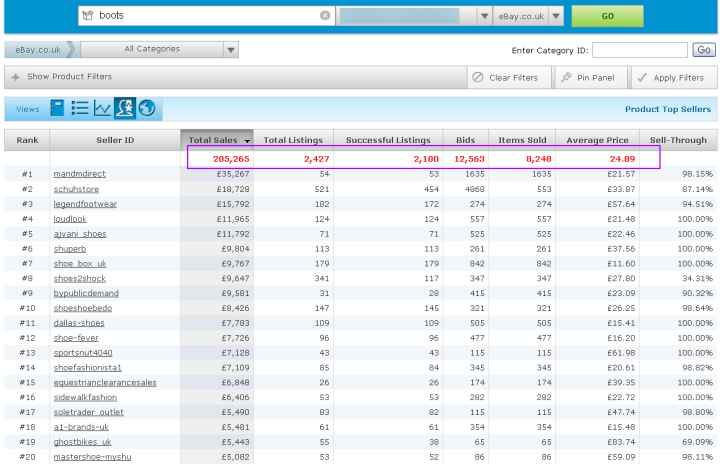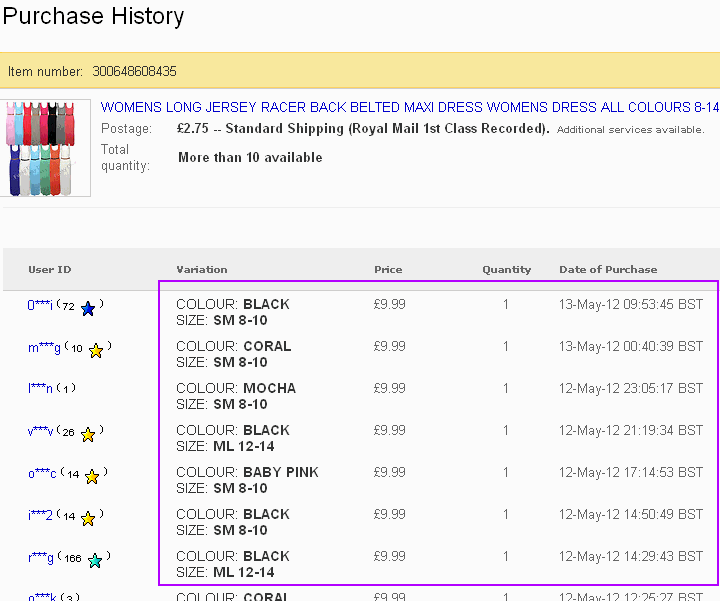Looking for BETA Testers – A Couple of eBay Related Widgets
Hola,
I’ve been working on a couple of widgets for eBay and I’m wondering if you would be interested in using them to help me make them better before they’re released publicly.
There are a few of them as listed below and I’ll cover them in more detail:
- Dynamic eBay Store Categories for eBay Listings
(Now live here) - Dynamic Related Items Gallery
- Terapeak Value Summaries
- Single & Multi-variation data extraction for sales
If any of these grab your attention, the contact details are at the bottom of this article.
Dynamic eBay Store Categories
Update: This is now live see this article.
Having the eBay shop categories in your listings can be exceptionally important as part of an exit strategy to your listings. So I’ve build a dynamic categories widget that anyone can use.
What does this widget do?
This widget brings in your eBay shop categories into your eBay listing and updates every 24 hours.
A little background

This widget has been bugging me for months and a few days ago I finally worked how it was done and wrote the code to create them for any account with an eBay Shop.
It’s fine if you have eSellerPro, a special keyword was added called “{{MenuCategoryList}}” that will bring through the eBay shop categories in your eBay listings from the template and allow you to format them (you also need to set some static information in maintenance > accounts for this to work properly).
But even that’s not the ideal solution as if you add or remove categories from your eBay Shop then you have to revise your live listings, which when you have thousands of listings can take hours to complete.
You could of course turn on the listing frame that eBay provides. This will do the same job, but it’s missing one key ability. The ability to style it as it’s outside the iframe that the listing description sits in. So that’s really only a temporary measure at best.
The part that has been bugging me is that not everyone has eSellerPro, even the keyword that they use is not ideal, plus as mentioned above the eBay listing frame is a viable alternative, but you just can’t style it using CSS and to have this as part of your eBay listing template can cost the best part of £100 from a couple of eBay design companies. Nice, but not worth £100 for that alone IMHO.
So now I’ve written a block of code that will give you the eBay shop categories dynamically, just add your eBay ID, paste into your eBay listing and it just works.
For advanced users, I’ve added ID and CLASS tags to the right sections of the category tree, you can style them however you like too. They’re cached overnight and if you add or remove categories, then they’ll be reflected the next day.
Dynamic Related Items Gallery
This also stems from a me seeing a piece of functionality a few weeks ago and putting it on my to-do list and actually getting around to coding this.
What does this do?
This will give you a scrolling related items widget that you can use in either your eBay shop or in your eBay listings and also control what is or what is not shown by shop category or keywords.
If you take a look at this eBay shop http://stores.ebay.de/Crumpler-Outlet you’ll see that there are two pretty cool rotating widgets for “Best Sellers” and “New Arrivals”. A screen shot of this is below:

While best sellers and new arrivals are nice for an eBay shop, what would be much better is that such a widget would be better off in the eBay listing and that’s exactly the route I took.
I now have a dynamic related items widget that will accept:
- No input for all the items in the shop,
- Items from a specific eBay shop category
- A specific keyword or set of keywords
- Or a combination of both a shop category and keywords
Oh and they can be fully customised to your eBay shop/listing template design as shown by the live listing here and in the screen shot below:

Terapeak Value Summaries
Terapeak is fab for mining one part of eBay which is sales related. But it has bugged me for months as I just can’t do the maths on the search results quick enough.
This is the first of two scripts that bend rules, hence you’ll need to read the disclaimer section further down when it comes to this and the eBay variations one below.
What does this do?
This will summarise the results page in less than a second for you and add it as summary line on the page. Thus saving you from trying to guestimate the results and give you accurate figures instantly.
I showed this to someone on Friday and they came back with an excellent suggestion (which I’ll add), which is that showing the totals and average sale price was fantastic, but they’d also like to know the market share of that keyword for each seller ID.
So next to eBay Seller ID, I’ll be adding percentage share that each Seller ID has for that specific search term. That’s exactly the reason why I’m sharing these to make them better!
A screenshot of this in action is below. Imagine you wanted to know what the total value of a specific search term(s) , the number of listings, bids, sold quantity as a total and a better idea of a ASP, you can now easily find out:

Single & Multi-Variation Data Extraction For Sales History
While we’re on the topic of Terapeak, Terapeak is excellent for working out relatively accurate sales figures for eBay listings, but the part where it falls down is that it does not report on the actual variations of a single or multi-variation listing.
That information is absolutely critical to making a buying decision based on sales history data.
Let me explain this to you with an example. I’ve made a search for “Maxi Dress” on eBay and found this item number http://www.ebay.co.uk/itm/300648608435 now let’s assume that we are able to source this or a similar product.

eBay tells us that +1,000 of these have sold and that’s great. Terapeak will give us a total sales value for that listing, but what it does not tell us is what combinations they sell and in what velocity.
So to make an informed buying decision on the same or similar product, we need to know what has sold, in which variations, at what price and when. That kind of information can make the difference between potentially buying the wrong sizes, the wrong colours and making profit.
This will extract this for you to a CSV file, with each variation on a separate line and able to handle up to 4 variations and for a total of 100 sales. The limit of 100 sales is what is imposed by eBay from the sales history page. Buyer details are not extracted as they’re irrelevant.
Disclaimer
The Terapeak script and the eBay extraction script both come with warnings as they both bend terms of service agreements and I’m writing this with two specific people in mind.
In both these instances a user can obtain this data by a basic copy/paste from the page and sorting it out in excel. Neither of these scripts make subsequent calls to other pages (ie: no extra page load because of their usage) and are either manipulating live data on a page or saving it in a well formatted manner for the purposes of bettering the users research activities. Also in both instances, neither are detectable as they are run client side :P
Your Feedback!
If any of these tickle your fancy, please contact me directly here and if you have any comments or suggestions on what I’ve covered above, I’d love to hear from you in the comments box below.



Very interesting Matt. I would like to speak to you more on this…
Hi Matt.
Would be happy to give it a run for you.
Hi Matthew
I would love to try out and use the dynamic categories code and give feedback, if it works ( i am sure it will) then i would appreciate your permission to use the code on a permanent basis. Channel grabber have not got to providing dynamic categories and i doubt they will for a while.
I would also be very interested in the related products bit again because i understand the basics of how people like frooition use keywords to load related products without users manually selecting items but you have to subscribe to there monthly server costs etc to use them as well as pay the £1000 design fee for the template.
I have looked around on the internet for both of the above and surprisingly to me they are harder to find information on than you might expect.
Kind regards
Kieran